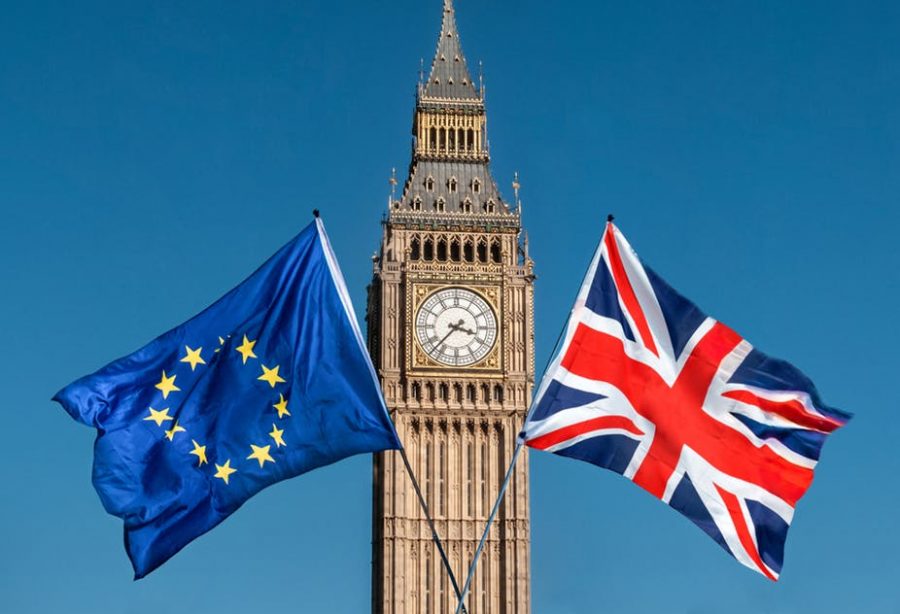Brexit: What’s Next?
Britain has decided to leave the European Union.
February 15, 2020
Britain left the European Union January 31st, 2020, and has entered a 11 month transition period towards independence from the union. Though the United Kingdom has left the political statues of the EU, the UK still must follow their general single market trade rules that don’t restrict free travel across the borders within EU countries. The split was finally executed by Prime Minister Boris Johnson and his Conservative Party, after securing a win in the Democratic general election.
European lawmakers approved of the plan in late January, although conservatives in the UK have been pushing for the separation for years. Johnson will now lead Britain into the most sensitive and critical step of its withdraw: determining a trade plan in regards of how closely they will still work with the EU. According to BBC News, this is the Brexit timeline: January 31st (Brexit Day, trade talks began), June 30th (Deadline for extending the transition period passes), December 31st (They evaluate if a effective trade has been agreed to and ratified), January 2021 (a final decision is made to determine if a new trade relationship with the EU is possible or if they go through the transition without a new trade deal.)
The history of Brexit is far more complicated than the origin of it’s name (a portmanteau of “British” and “exit”). Brexit became popular first as Britain proposed to split from the European Union and change their relationship with the bloc on trade, security, and migration. Ever since the idea of leaving first arose, Britain has been debating the pros and cons of their membership. They held their first referendum in 1975 when it was called the European Economic Community. Sixty-seven voters voted on staying at the time. However, the debate continued long after that. Primer Minister David Cameron called a national referendum in order to settle the question once and for all in 2013. The options were just as: stay or leave. Cameron thought that voters would choose to stay by a great margin. Cameron had thought wrong.
In June 13th, 2016, when it was Britain’s time to vote, a refugee crisis had caused hysteria across the country and made migration a political topic. At the same time, the Leave campaign was being accused of using lies and false information to advertise their platform. It was also accused of breaking election laws. Despite the controversy, it was revealed that withdrawal from the bloc was supported by 52% of voters.
Why is Brexit such a big deal? Europe is Britain’s biggest contributor when it comes to export market and foreign investment. Additionally, being a member has made London a solid global financial center. Also, crucial businesses have stated that they are leaving or threatening to leave Britain because of Brexit. The government has concluded that after Brexit the economy will be 4-9 percent weaker. This also depends heavily on the relationship between Britain and the Union afterwards. Theresa May, Prime Minister of the UK and Leader of the Conservative party from 2016 to 2019, says that Brexit is an end to free immigration. Workers who saw immigration as a threat to their jobs saw this as a win. However, cutting free movement would be a two-way-street; cutting free movement was disappointed to younger generations who wished to study abroad beyond Britain.
What happens next? As important as January 31st was, it’s only the beginning of a intense transition. Politicians now have to decide the future of UK and EU relations. The decision has to come quick, however, as Johnson has promised to leave the EU by the end of the year. If this is indeed true, the European Union and Britain would have to negotiate a trade deal at an extremely fast pace. It took the EU and Canada over seven years for them to come to a conclusion on their trade deal. This negotiation would have to include Britain’s biggest bulk of the economy: manufactured goods and services. If they fail to come to an agreement or a narrow one, it would cause multiple problems for the next year such as increased tariffs and border disruption.
We have yet to see what happens in the future of Brexit. “I think people are yearning . . . for this great Incubus [Brexit] to be pitchforked off the back of British politics.”stated Johnson. “They want us to get on with some fantastic things for this country.”

